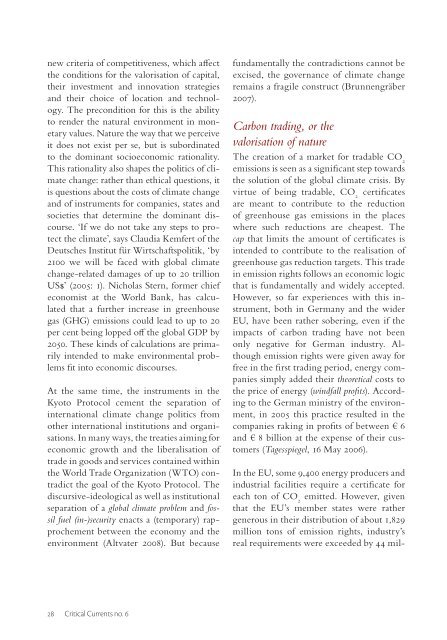Contours of Climate Justice - Dag Hammarskjöld Foundation
Contours of Climate Justice - Dag Hammarskjöld Foundation
Contours of Climate Justice - Dag Hammarskjöld Foundation
Create successful ePaper yourself
Turn your PDF publications into a flip-book with our unique Google optimized e-Paper software.
new criteria <strong>of</strong> competitiveness, which aff ect<br />
the conditions for the valorisation <strong>of</strong> capital,<br />
their investment and innovation strategies<br />
and their choice <strong>of</strong> location and technology.<br />
The precondition for this is the ability<br />
to render the natural environment in monetary<br />
values. Nature the way that we perceive<br />
it does not exist per se, but is subordinated<br />
to the dominant socioeconomic rationality.<br />
This rationality also shapes the politics <strong>of</strong> climate<br />
change: rather than ethical questions, it<br />
is questions about the costs <strong>of</strong> climate change<br />
and <strong>of</strong> instruments for companies, states and<br />
societies that determine the dominant discourse.<br />
‘If we do not take any steps to protect<br />
the climate’, says Claudia Kemfert <strong>of</strong> the<br />
Deutsches Institut für Wirtschaftspolitik, ‘by<br />
2100 we will be faced with global climate<br />
change-related damages <strong>of</strong> up to 20 trillion<br />
US$’ (2005: 1). Nicholas Stern, former chief<br />
economist at the World Bank, has calculated<br />
that a further increase in greenhouse<br />
gas (GHG) emissions could lead to up to 20<br />
per cent being lopped <strong>of</strong>f the global GDP by<br />
2050. These kinds <strong>of</strong> calculations are primarily<br />
intended to make environmental problems<br />
fi t into economic discourses.<br />
At the same time, the instruments in the<br />
Kyoto Protocol cement the separation <strong>of</strong><br />
international climate change politics from<br />
other international institutions and organisations.<br />
In many ways, the treaties aiming for<br />
economic growth and the liberalisation <strong>of</strong><br />
trade in goods and services contained within<br />
the World Trade Organization (WTO) contradict<br />
the goal <strong>of</strong> the Kyoto Protocol. The<br />
discursive-ideological as well as institutional<br />
separation <strong>of</strong> a global climate problem and fossil<br />
fuel (in-)security enacts a (temporary) rapprochement<br />
between the economy and the<br />
environment (Altvater 2008). But because<br />
28 Critical Currents no. 6<br />
fundamentally the contradictions cannot be<br />
excised, the governance <strong>of</strong> climate change<br />
remains a fragile construct (Brunnengräber<br />
2007).<br />
Carbon trading, or the<br />
valorisation <strong>of</strong> nature<br />
The creation <strong>of</strong> a market for tradable CO 2<br />
emissions is seen as a signifi cant step towards<br />
the solution <strong>of</strong> the global climate crisis. By<br />
virtue <strong>of</strong> being tradable, CO 2 certifi cates<br />
are meant to contribute to the reduction<br />
<strong>of</strong> greenhouse gas emissions in the places<br />
where such reductions are cheapest. The<br />
cap that limits the amount <strong>of</strong> certifi cates is<br />
intended to contribute to the realisation <strong>of</strong><br />
greenhouse gas reduction targets. This trade<br />
in emission rights follows an economic logic<br />
that is fundamentally and widely accepted.<br />
However, so far experiences with this instrument,<br />
both in Germany and the wider<br />
EU, have been rather sobering, even if the<br />
impacts <strong>of</strong> carbon trading have not been<br />
only negative for German industry. Although<br />
emission rights were given away for<br />
free in the fi rst trading period, energy companies<br />
simply added their theoretical costs to<br />
the price <strong>of</strong> energy (windfall pr<strong>of</strong>i ts). According<br />
to the German ministry <strong>of</strong> the environment,<br />
in 2005 this practice resulted in the<br />
companies raking in pr<strong>of</strong>i ts <strong>of</strong> between € 6<br />
and € 8 billion at the expense <strong>of</strong> their customers<br />
(Tagesspiegel, 16 May 2006).<br />
In the EU, some 9,400 energy producers and<br />
industrial facilities require a certifi cate for<br />
each ton <strong>of</strong> CO 2 emitted. However, given<br />
that the EU’s member states were rather<br />
generous in their distribution <strong>of</strong> about 1,829<br />
million tons <strong>of</strong> emission rights, industry’s<br />
real requirements were exceeded by 44 mil-
















